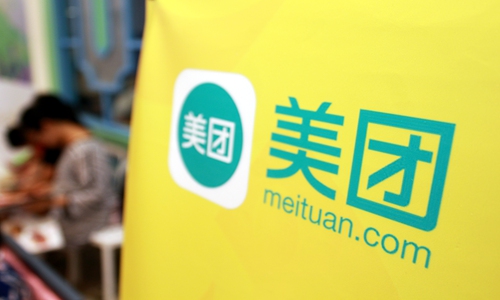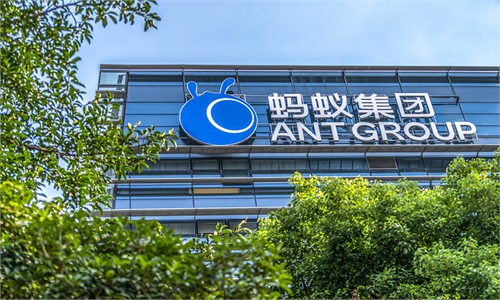
Meituan Photo: cnsphoto
Since late last year, government supervision of internet service platforms has tightened in China, with online financial businesses being placed under scrutiny. As a result, the fintech giants have put brakes on their online deposit products to meet regulatory requirements.Industry analysts have seen subsequent removals of many internet-based financial products from the platforms, as a result of the government's stricter regulation measures, which also indicate from now on, China's internet finance is no longer a land beyond the law.
Meituan, a major online delivery platform, announced on Friday that it will shut down its online "health care mutual aid" program on January 31 and will refund all members' shared fees in full, the company said in a statement.
Meituan's move followed a number of similar steps by other internet giants, which have opted to cancel their online financial products. Late last year, the People's Bank of China and China Banking and Insurance Regulatory Commission (CBIRC) jointly issued a notice on regulating commercial banks' business through the internet platforms, including products like personal deposits, loans and insurance policies.
Fintech giant Alibaba's Ant Group confirmed in December that it had "proactively" removed a good number of online deposit products from its platforms in line with the stricter regulatory requirements on the internet deposit industry, according to media reports.
JD Finance App, the financial product of e-commerce JD.com, has followed its peers in stopping updates to its online deposit products last month. Other internet companies, including Tencent and Baidu, also move to suspend trading of online financial products on their financial platforms.
Watershed of industry
Insiders believe that new regulations on internet platforms will become the watershed of the industry, while not ruling out some offline businesses providing similar financial products in the future.
In terms of the nature of Meituan's health-care aid service, and the Xianghubao service launched by Ant Group in 2018, analysts say the products should be seen online insurance policies, which will be put under oversight.
"It's a grey area. On the one hand, internet platforms may consider the sustainability of their businesses, which have seen more users running to the door. On the other hand, they are considering how to avert rising market risks. After all, under strict supervision, the mutual aid online services are difficult to obtain a license from the regulators," an industry insider told the Global Times on Saturday.
Data showed that the number of users who buy online mutual aid products is declining rapidly, month by month. The biggest loss was more than 3 million users within three months, media reports said.
"The regulation is certainly not friendly to the online mutual-aid model," said one industry insider.
Tighter regulation
There has been a tightening of regulation and increased supervision on Internet giant platforms since late last year.
Under the guidance of the country's financial authorities, Ant Group has set up a rectification team and is working on a timetable for business rectification, while maintaining business continuity and normal business operations and ensuring the quality of its financial services to the public, said Chen Yulu, deputy governor of the central bank, on Friday. Financial authorities are also in close regulatory communication with Ant Group, and relevant progress will be released in a timely manner.
Prior to this, CBIRC also suggested that all Internet platforms conduct self-examination and business rectification as Ant Group did, as soon as possible. In particular, institutions that offer small loans, insurance policies, financial management and other services should pay close attention, and the regulatory authorities will arrange inspections in 2021.
Recent regulations point to a sign that China is strengthening supervision of its online financial markets, especially giant internet platforms, Wang Peng, an assistant professor at the Gaoling School of Artificial Intelligence at the Renmin University of China, told the Global Times.
"The traditional regulatory system is being circumvented by emerging fintech giants, also called platform economy in China. Those internet giants, which rely on the huge market scale of China to develop their users base, have obviously become 'above the law'. New regulations are now released to better supervise the new economy, in a bid to solve the problem of 'too big to fail' and industry monopolies," said Wang.
Industry insiders say it is possible that internet financial service platforms may separate from other internet-based businesses in the future, and some internet platforms could be asked to set up financial holding companies to implement their online financial products, but they could never escape government supervision.

